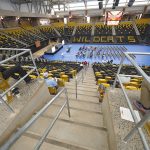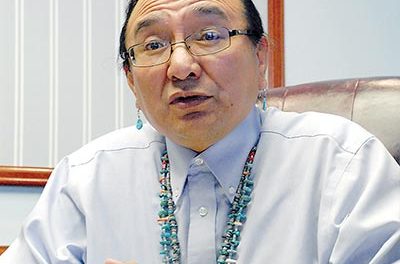
Without a comprehensive budget in place, tribe is operating under a continuing resolution
WINDOW ROCK
Over two months ago, emergency legislation CS-39-24, also known as a continuing resolution, was passed to provide temporary funding for the tribal government to prevent layoffs, furloughs, and government shutdowns from Oct. 1, 2024, to March 31, 2025.
Despite calling for immediate action to establish a comprehensive budget, highlighting potential long-term consequences of the current approach by Navajo Nation President Buu Nygren, who expressed strong concerns about emergency legislation on Sept. 27, little to no progress has been made from the president’s office or the Navajo Nation Council.
Emergency legislation CS-39-24, described as a hybrid between a continuing resolution and a comprehensive budget, allocates full-year funding to some departments while restricting others to six months. President Nygren criticized the measure as “unprecedented” and “confusing,” suggesting that it could create operational inefficiencies and unintended consequences.
“This hodgepodge approach places unnecessary burdens on employees and undermines the effectiveness of government services,” Nygren said in a statement. “The Navajo people deserve a budget that reflects their needs and allows for strategic investments in infrastructure, education, and health care.”
September 26 statement from the Council
In a statement issued on Sept. 26, Speaker Crystalyne Curley’s office strongly urged President Nygren to address CS-39-24, which was unanimously approved by the Navajo Nation Council on Sept. 16 and delivered to the president’s office for review on Sept. 17. The Council emphasized the importance of the resolution in maintaining government operations and avoiding layoffs.
“The Navajo Nation Council continues to receive inquiries from Navajo citizens, including elders and veterans who rely on direct services, as well as employees who are concerned with their employment status beyond next week when the current fiscal year ends,” Speaker Curley said in her Sept. 26 statement. “The Council took action to ensure continued government operations and to prevent any furloughs or layoffs of Navajo Nation employees. As stated previously, the 25th Navajo Nation Council remains committed to adopting a comprehensive budget as soon as possible, but we need action to be taken by the president on the (continuing resolution).”
Before the line item vetoes, the CS-39-24 the Council passed would have provided 50 percent of the fiscal 2024 comprehensive budget amounts for all Navajo Nation programs, departments, and divisions for six months, including funding from the General Fund, the 110 Navajo Nation chapters, the Personnel Lapse Fund, and fixed costs.
The Council’s approved emergency resolution also secures full funding for the Navajo Nation Veterans Trust Fund to ensure that Navajo veterans continue to receive their benefits, Diné Higher Education Grant Fund receives 100 percent of funding to support scholarships for Navajo students, as well as Navajo Technical University and Diné College being guaranteed their full funding amounts under the resolution.
The emergency resolution passed by a vote of 20-0 on Sept. 16.
Key line-item vetoes
President Nygren exercised his line-item veto authority on several aspects of CS-39-24 to correct errors and reprioritize funding. The vetoed items include:
1. Travel and media funding for the Legislative Branch
$10,000 for vehicle rentals (off-Navajo Nation).
$20,000 for air travel.
$30,000 for media services.
$500,000 for contractual services.
2. Consulting and legal services
$120,000 for consulting services.
$103,504 for attorneys’ fees.
3. Building repairs and maintenance
$641,160 for building repairs and HVAC unit installation.
4. Personnel and office adjustments
$1,983,220 for a retirement plan account to address calculation errors in Exhibit 2.
In total, President Nygren’s line-item vetoes amount to $2,789,726 – funds he pledged to reinstate during the comprehensive budget process if necessary. These vetoes aim to limit spending on non-essential items like off-Navajo Nation travel and external consultants while focusing on the immediate needs of Navajo Nation employees and programs.
Response from the speaker
During the Navajo Nation Council’s Fall Session on Oct. 21, Speaker Crystalyne Curley defended the Council’s unanimous passage of the six-month fiscal 2025 continuing resolution. She emphasized that the resolution was designed to maintain direct services and government operations following the end of the fiscal year on Sept. 30.
The speaker’s remarks have sparked discussions among Council members about the balance of power within the Navajo Nation government and the broader implications of veto authority.
Funding allocations preserved
Despite the vetoes, significant funding was approved for critical programs:
Veterans services: $5.79 million for the Navajo Nation Veterans Trust Fund and $4.84 million for the Veterans Housing Program.
Education: $12.4 million for higher education, including $4.7 million for Diné College and $4.2 million for Navajo Technical University.
Victim services: $1.16 million, including $500,000 for Missing and Murdered Diné Relatives initiatives.
Chapters utilities: $750,000 for Navajo Nation chapters to address rising utility costs.
President Nygren emphasized the importance of these allocations but called for more strategic, long-term planning through a comprehensive budget.
The president urged the Council to prioritize the comprehensive budget process, adhering to the Three Branch Chiefs’ Agreement, a long-standing practice aimed at balancing government planning. President Nygren set a target for the Council to deliver the budget by early November 2024 to avoid prolonged uncertainty.
“Our priority and focus over the next few weeks must be on passing a comprehensive budget for fiscal year 2025 that our leaders will be proud of,” Nygren said. “We need to ensure that government services are uninterrupted and that we provide our people with the resources they deserve.”
With a deadline looming, the Navajo Nation faces the challenge of balancing immediate needs with long-term sustainability. Meanwhile, the debate over veto authority and legislative resources continues to unfold.







 Highway 264,
Highway 264, I-40, WB @ Winslow
I-40, WB @ Winslow